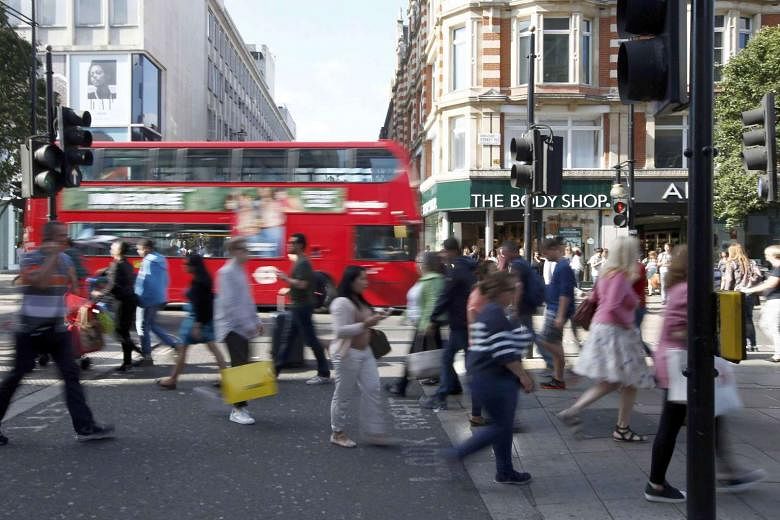LONDON (BLOOMBERG) - British consumers are starting to feel Brexit's bite.
Real wages are rising at the weakest pace since early 2015, data published Wednesday show, as oil prices and the weaker pound stoke inflation. The pressure looks set to intensify with employment growth slowing and some economists predicting price gains as fast as 3 per cent next year.
"There are signs of cracks appearing in the UK labour market after resilience in the run-up to, and immediate aftermath, of June's Brexit vote," said Howard Archer, chief UK and European economist at IHS Global Insight. "Muted earnings growth threatens to weigh down on consumers' purchasing power along with markedly rising inflation."
Signs of the crunch come a day after data showed inflation hit 1 percent in September, the fastest in almost two years. While wages are still rising faster, they may not be able to keep up for long. That will undermine consumer spending, the UK's economic growth engine. Gap's Banana Republic chain plans to close its UK stores next year as sales slip.
The most recent inflation and unemployment data also predate sterling's 5 per cent drop this month. Barclays on Tuesday revised their 2017 consumer-price growth forecast to 2.3 per cent from 1.9 per cent. The pound whipsawed between gains and losses Wednesday, leaving it little changed at US$1.2308 as of 11:55 a.m. London time.
The number of people in work rose by 106,000 in the quarter through August, down from increases above 170,000 in recent months, the Office for National Statistics in London said on Wednesday. While the gain was enough to keep the jobless rate at an 11-year low of 4.9 per cent, nominal incomes are rising just above 2 per cent a year. Adjusted for inflation, basic pay gains slowed to 1.7 per cent.
The outlook for faster inflation and slower wage growth underscores the dilemma facing Bank of England policy makers as they consider whether to add to stimulus measures put in place following Britain's vote to leave the European Union. Officials have indicated they may loosen policy again and more than 70 per cent of economists in a Bloomberg survey expect an interest-rate cut on Nov. 3.
While the economy has held up better than expected since the June EU referendum, a sharp slowdown is predicted next year with firms already reporting cuts to hiring and investment plans. Figures for August alone show the unemployment rate rising to 5 per cent from 4.7 per cent.
The number of people out of work rose for the first time since February. Jobless claims - a narrower measure of unemployment - increased for a second month. Basic pay growth accelerated to 2.3 per cent from 2.2 per cent.
"The labour market will probably maintain reasonable momentum into year-end," said David Tinsley, chief European economist at Exane BNP Paribas. "But next year it'll be much harder, and unemployment should rise. At the same time, with inflation picking sharply, real wage rises will likely slow very sharply."

